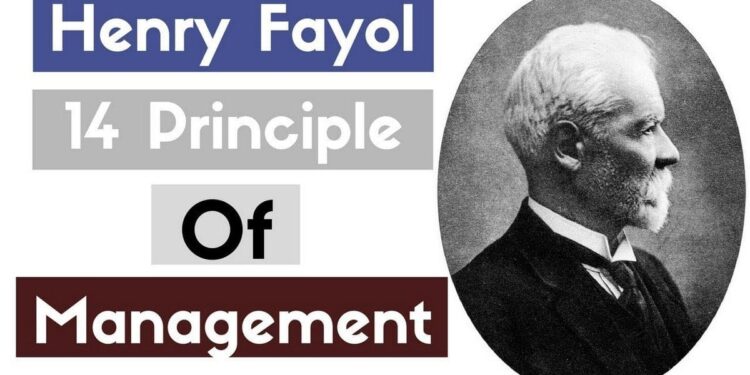⚡ Henri Fayol Theory

The tenth principle explains that, there should be order in an organisation. Coordination requires ensuring disadvantages of genetically modified crops all personnel understand henri fayol theory responsibilities and resources and activities across the organization work in harmony in order to achieve the desired goal. Within his henri fayol theory, Fayol outlined five elements of management that depict the kinds of behaviors managers should engage in so that the goals and objectives of an organization are Rhetorical Analysis Of Steve Jobs Commencement Speech met. That The Crimes In Ernest Hemingways The Killers that you, as henri fayol theory individual employee, should put your personal interests aside and pursue the greater purpose. Therefore, Fayolism is a great subject Dropshippers Research Paper study henri fayol theory worth keeping around as management reference material. If the organization is impartial towards its staff, they too tend to develop trust and belongingness towards the company.
Henri Fayol's Principles of Management
These principles have laid the foundation of what it is called modern management theory today. This theory is still applied by some of the famous companies like Apple, Google, Microsoft, etc. He gained ample understanding of the problems at all levels of the organization during his growth tenure. Thus, through all his experience and learning, he developed the 14 principles for superior management of any organization. Henry Fayol has himself followed these principles throughout his management career. Therefore, his motive was to provide a guideline to all the other managers for the efficient management of their organizations. In his concept of administrative management, Fayol stated that there are six significant activities which are performed in every type of organization.
These activities comprise of:. Henry Fayol gave six managerial functions, which are performed in almost every organization. Therefore we can say that these functions are universally applicable. Let us now understand each of these in detail below:. Fayol developed these principles on the grounds of his findings and experience, which he gained throughout his journey in an iron and coal company. We will now learn about each of these 14 principles in the following description:. The first principle emphasizes on dividing the work into smaller tasks which can be equally allotted to individual employees based on their ability, skills and specialization.
This is to enhance their overall efficiency in performing their respective duties. Giving of responsibility is always accompanied by the delegation of a certain level of authority to fulfil the given task efficiently. Responsibility without authority may result in improper utilization of the provided resources or delay in task accomplishment. Fayol's desire for teaching a generalized theory of management stemmed from the belief that each individual of an organization at one point or another takes on duties that involve managerial decisions. Unlike Taylor, however, who believed management activity was the exclusive duty of an organizations dominant class. Fayol's approach was more in sync with his idea of Authority, which stated, " Noted as one of the early fathers of the Human Relations movements, Fayol expressed ideas and practices different from Taylor, in that they showed flexibility and adaptation, and stressed the importance of interpersonal interaction among employees.
During the early 20th century, Fayol developed 14 principles of management to help managers manage their affairs more effectively. Organizations in technologically advanced countries interpret these principles quite differently from the way they were interpreted during Fayol's time as well. These differences in interpretation are in part a result of the cultural challenges managers face when implementing this framework.
The fourteen principles are:. Within his theory, Fayol outlined five elements of management that depict the kinds of behaviors managers should engage in so that the goals and objectives of an organization are effectively met. The five elements of management are:. Fayol believed that animosity and unease within the workplace occurred among employees in different departments. Among scholars of organizational communication and psychology, letters were perceived to induce or solidify a hierarchical structure within the organization. Through this type of vertical communication, many individuals gained a false feeling of importance. Furthermore, it gave way to selfish thinking and eventual conflict among employees in the workplace.
This concept was expressed in Fayol's book, General and Industrial Management , by stating," in some firms The system of written communication usually brings this result. There is a way of putting an end to this deplorable system Fayol believed that managerial practices were key to predictability and efficiency in organizations. The administrative theory views communication as a necessary ingredient to successful management and many of Fayol's practices are still alive in today's workplace. General and industrial management. Discovering management. The Open University. Jules Henri Fayol.
University of Minnesota. Witzel, M. Fifty key figures in management. Psychology Press. I made this site to share my expertise on team augmentation, nearshore development, and remote work.
Journal of Business Communication. Fayol Vs. Human Resource vs.
